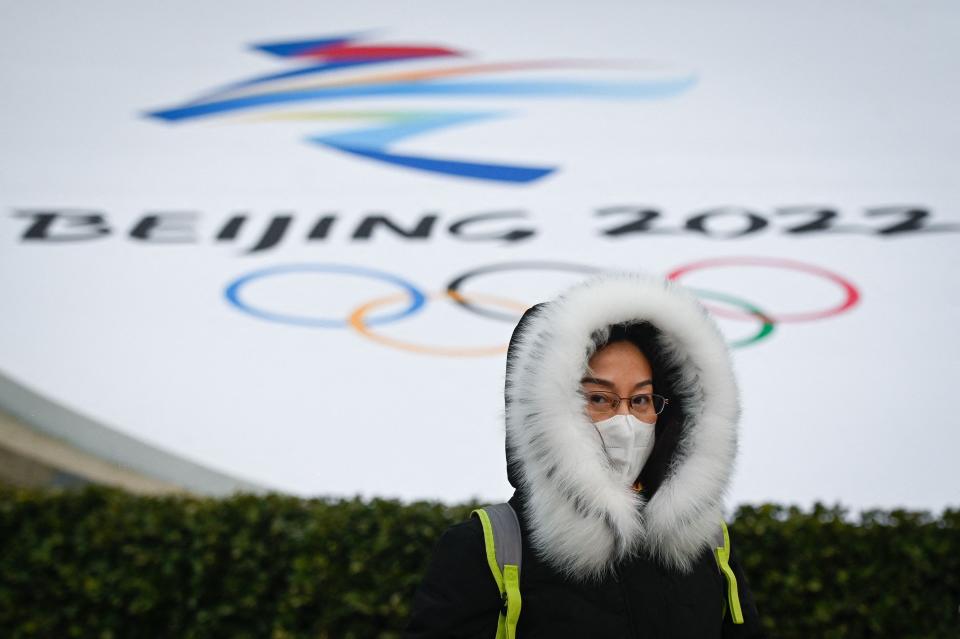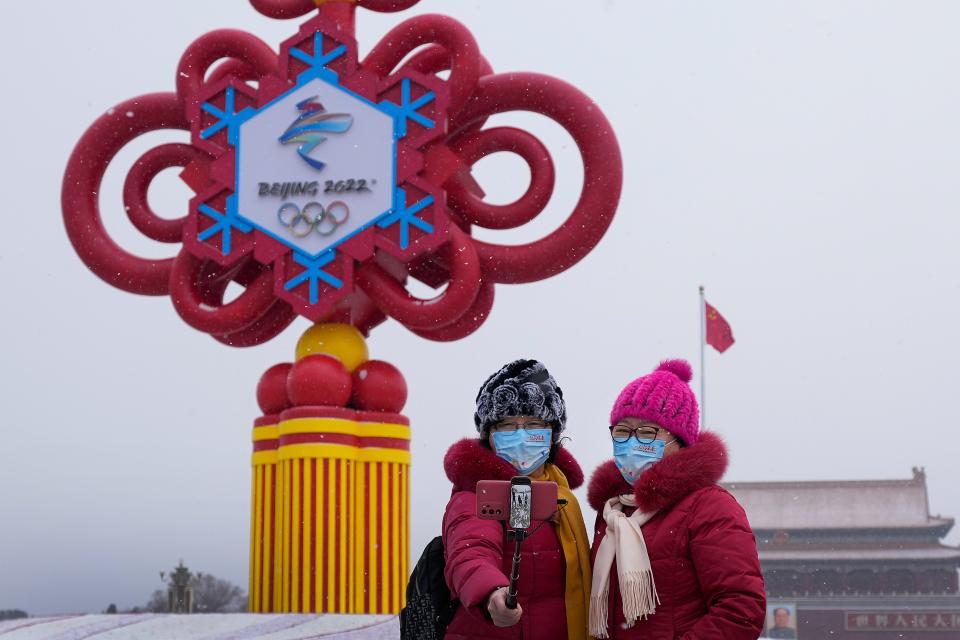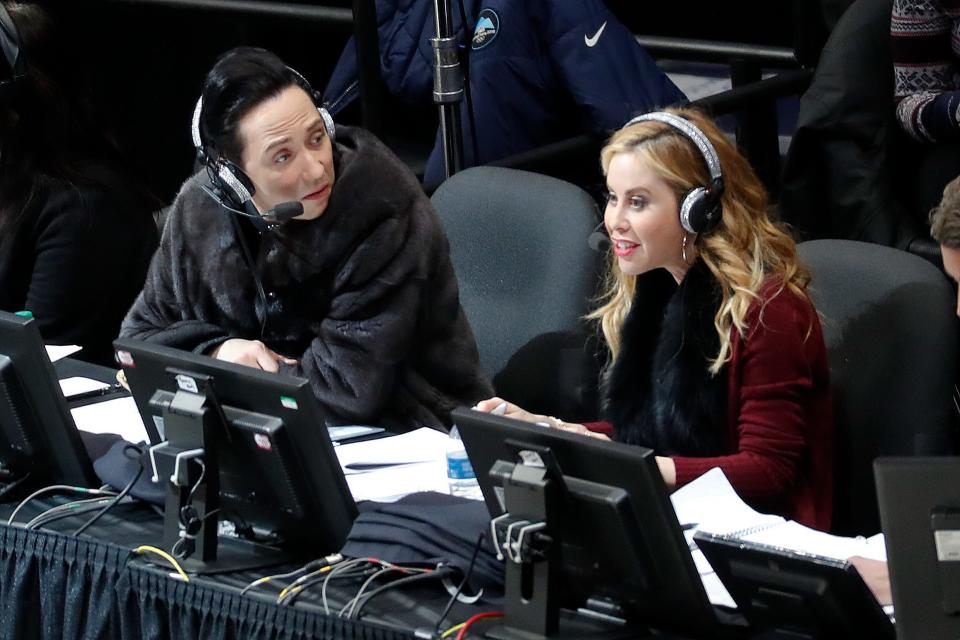China's zero-COVID policy has some asking how Winter Games can go on during omicron surge
- Oops!Something went wrong.Please try again later.
Tara Lipinski and Johnny Weir will be sitting in Connecticut rather than rinkside at the Beijing Olympics. Athletes who have recovered from COVID could wind up stuck in quarantine rather than standing atop the medals podium. And Chinese officials are petrified of piercing the very strict bubble the country has been under the past two years
The omicron wave that is still surging across the globe presents a direct conflict to China’s zero-tolerance policy for COVID, leaving many to ask the question: Why are the Beijing Olympics still going ahead?
“Sure, they can happen. Japan has proven you can do it successfully. But I think it depends on what are the expectations,” said Tara Kirk Sell, a senior scholar at Johns Hopkins Center for Health Security and a 2004 Olympic silver medalist in swimming.
“The zero-COVID expectation is a pretty high bar and, given the transmissibility of omicron, leaves very little margin for error,” Kirk Sell said. “Is that reasonable? I don’t know. If anyone can do it, China can. But it’s going to be really difficult.”

The alternative, however, would be devastating for athletes who have spent years, if not decades, training with the hope of competing at the Olympic Games. That isn't lost on Sarah Hirshland, CEO of the U.S. Olympic and Paralympic Committee.
"We have every opportunity to provide those who are at the peak of their athletic careers right now the opportunity to achieve their dreams," Hirshland told USA TODAY Sports. "As long as we can do that in an environment that is healthy and safe for everybody, we should be doing it. I think we have all the confidence in the world that we can."
Daily COVID tests, strict rules in Beijing's 'closed loop'
China has taken a draconian approach to combatting COVID since the pandemic began in late 2019. The rest of the world has largely been shut out, and domestic cases are met with fierce countermeasures. Entire cities have been locked down for weeks and millions of residents tested over outbreaks so small they wouldn’t even raise an eyebrow in the United States.
NBC'S OLYMPIC PLANS: Some announcers will call action from USA due to COVID
SIGN UP FOR OUR NEWSLETTER! Stay up to date with everything you need to know about from the Beijing Games
But with the Beijing Olympics beginning Feb. 4, and the Paralympics running March 4-13, China will welcome thousands of people over the next eight weeks. Athletes and their coaches. Support staff. The International Olympic Committee. Media.
“You’ve got a really dangerous brew going on. On the one hand, China has this zero-COVID strategy and, on the other hand, you’re gathering this enormous international array of athletes and (others) that are going to absolutely pose a significant risk,” said Lawrence Gostin, a Georgetown professor and director of the World Health Organization Collaborating Center on National & Global Health Law.
Building off protocols used at the Tokyo Olympics last summer, the IOC and Beijing organizers insist that the Winter Games can be held safely.
The Games will take place in a “closed loop” system, with everyone either fully vaccinated or having quarantined for 21 days after entering the country. All participants must show proof of two negative tests before leaving for China, one within 96 hours of departure and another within 72. Everyone will undergo daily testing.

There also will be strict measures – a geotracking app and food delivered by robots among them – to limit possible exposure.
But omicron has upended those careful preparations.
“The concern is they proved (Olympic protocols) work with delta,” Kirk Sell said. “The differences that we are seeing with omicron make the equation different. And certainly makes it much harder.”
Several high-profile athletes have tested positive recently
Omicron is highly transmissible – between two and four times more contagious than the delta variant – and can evade vaccines. While cases have been less severe, allowing for faster recoveries and shorter quarantines, there is concern that China’s more sensitive testing could rule out athletes who have recently recovered from COVID or keep them in quarantine limbo.
The cycle threshold (CT) that the Beijing Olympic Committee is using to detect COVID infection is 40, according to Jonathan Finnoff, chief medical officer of the USOPC. That’s more stringent than the CT used by the NFL (35), as well as the NBA and NHL (30).
That means athletes could test positive if they’re still “shedding” the virus, even if they’re no longer contagious. But it is highly unlikely, Finnoff told USA TODAY Sports on Thursday.
"If we do repetitive PCR testing in the United States, which is happening right now to all of our athletes, the likelihood that they're going to have a large enough sample of the genetic material to trigger a positive sample over in Beijing is very low. It's not impossible but it's very low," Finnoff said.
Given the omicron surge worldwide, and the years athletes have spent training and sacrificing for this moment, it is not an unreasonable concern, however. Especially considering several high-profile athletes have tested positive recently.
Two-time national champion Alysa Liu was among several athletes forced out of the U.S. Figure Skating Championships earlier this month after testing positive for COVID. Olympic champions Mikaela Shiffrin and Shaun White both had COVID last month, as did several members of the U.S. women’s hockey team.
Canada also has had outbreaks in several sports, including its women’s hockey team. Its Olympic trials for mixed doubles curling were called off because of COVID.
“We are working closely with IOC and (Beijing organizers) to ensure that members of Team Canada who have recovered from COVID are able to compete while meeting Chinese public health regulations,” Team Canada said in a statement issued Wednesday.
“It is important to note that although the frequent testing in Beijing is designed to identify infections early and prevent transmission, it is not meant to unjustly exclude those with false positives or who have recovered from COVID but are persistent shedders.”
The IOC said that is why a Medical Expert Panel (MEP) has been created. The 20-person MEP includes members of the China Center for Disease Control, the Beijing Center for Disease Control and five international expert representatives from the IOC, International Paralympic Committee and winter sport federations.
The MEP will consider “complex cases,” and could potentially allow athletes who are testing positive despite being recovered to be cleared.
“We need to be careful in assessing all the cases, of course. We need to protect the safety of everyone,” Pierre Ducrey, the IOC’s Olympic Games operations director, told USA TODAY Sports.
“There is a process to establish if there is viral shedding or not,” Ducrey said. “This will be through the medical expert panel.”
The panel can only make a recommendation, however. The ultimate decision will be up to Chinese authorities, and that is causing unease among athletes, Olympic committees and even media outlets.
NBC Sports told USA TODAY Sports on Wednesday that it is not sending any of its announcing teams to Beijing. They will work out of NBC Sports headquarters in Stamford, Connecticut, instead.
While some commentators were always going to be in the United States for the Games, just as some were for the Tokyo Olympics last summer, NBC initially planned to send Lipinski and Weir to Beijing. Same for the commentating teams for Alpine skiing and snowboarding.
But the possibility of losing a high-profile talent like Lipinski or Weir to an extended quarantine became too big a chance for NBC to take.

“I have every confidence that my experience, and my 13 suitcases of fun, will help me bring the greatest spectacle in the world to life, no matter where I am,” Weir said Thursday in a Twitter post.
“I am proud to work for a company that puts my health & ability to do what I love, first,” the two-time Olympian in figure skating added. “I know that I will be bringing just as much heart and passion to our broadcasts from Stamford, something our team has done many times before, to provide an equally great experience for our viewers.”
The heightened fears over COVID, and China’s heavy hand in containing the virus, adds to a Games already fraught with baggage.
Citizen Lab, an internet watchdog group, said this week that the My2022 app, which will be used by most people going to the Beijing Olympics, has glaring security flaws that could lead to sensitive personal information being hacked. The United States and several other countries had already warned athletes to assume their online activity will be monitored while they are at the Games, and recommended they leave personal devices like phones, computers and cellular watches at home.
"Despite any and all safeguards that are put in place to protect the systems and data that are brought to China, it should be assumed that all data and communications in China can be monitored, compromised or blocked," the U.S. Olympic and Paralympic Committee said in a technology bulletin to athletes.
Also this week, speakers at a Human Rights Watch panel recommended that athletes not criticize China on human rights, particularly its repression of the minority Muslim Uyghur community, until they return home out of concerns for their safety. The warning came as a Beijing organizing committee official threatened that athletes who speak out could be punished.
“Any expression that is in line with the Olympic spirit I’m sure will be protected," Yang Shu, deputy director general of international relations for the Beijing Organizing Committee, said during a news conference Tuesday. “Any behavior or speech that is against the Olympic spirit, especially against the Chinese laws and regulations, are also subject to certain punishment.”
Asked what protections the IOC can assure athletes following Yang’s statement, Ducrey sidestepped the question.
“We carried this very wide consultation with the athletes’ community to clarify when you can talk about certain topics and when you cannot,” he said.
The IOC has also come under criticism for not holding China accountable for its human rights abuses and, in the case of tennis player Peng Shuai, being complicit in her silencing.
As international outrage grew over the treatment of Peng, who was not seen in public for almost three weeks after she accused a former top Chinese official of sexual assault, IOC President Thomas Bach staged what was effectively a photo op with the three-time Olympian. Bach declared her to be fine after their phone call, but no audio was released and Peng still has not spoken freely.
In a rebuke to both China and the IOC, the United States last month announced a diplomatic boycott of the Beijing Olympics, citing “ongoing genocide and crimes against humanity in Xianjing and other human rights abuses.” Several other countries have since joined in.
Taken together, it makes for a very challenging Olympics, Gostin said.
“It means a lot to China’s reputation to host the Olympics,” he said. “This is a showcase for the Communist party. I’m not sure the West should go along with it.”
This article originally appeared on USA TODAY: Beijing Olympics amid COVID surge will be tough for China to pull off

